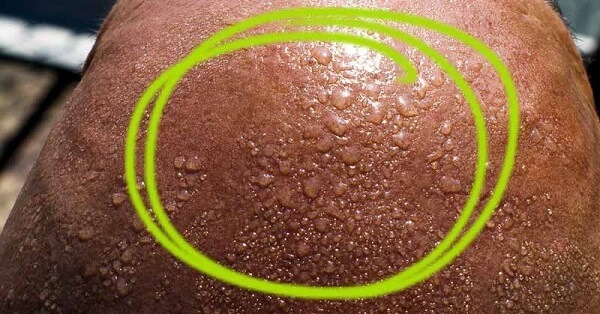The One Nutrient Your Body Must Have That Practically All Foods Are Deficient In Especially Plant Foods

I didn’t know that our bodies required a nutrient that has to be so specifically customized for the individual…literally. A combination of factors like your age, your race, where you live on the planet and even the type of diet you adhere to must be placed into the equation to determine how much of this nutrient that your body needs.
Excessive head sweating as shown in the image above is one of the symptoms that you are deficient in this nutrient.
A significant nutrient that our bodies must have to maintain proper bone health, optimal muscle function, cardiovascular health and to prevent the development of certain diseases like osteoporosis, rickets, hypertension, diabetes, dementia, cancer and autoimmune diseases like multiple sclerosis in our bodies is…
…the sunshine vitamin, specifically called Vitamin D.
Vitamin D can be gotten from 3 sources: the Sun being the best source, then from food sources and arguably in the only significant amounts from supplements both animal and vegan derived.
What is Vitamin D
Vitamin D is completely different from all other vitamins that our bodies need. It is uniquely different by the fact that our bodies actually produces it if it has the proper catalysts.
In actuality, Vitamin D is not a vitamin at all. It is actually a steroid hormone that our bodies produce out of our cholesterol when our skin is exposed to the sun. Hence, why it is called the “sunshine” vitamin.
It is a fat-soluble vitamin that dissolves in fat or oil and can be stored for use by our bodies over a prolonged period of time.
There are two forms of Vitamin D that our bodies use. Vitamin D3 (cholecalciferol) is a form found in fatty fish like salmon and tuna, fish liver oils or meat by-products such as egg yolks. Vitamin D2 (ergocalciferol) is a form found in some plants like spinach and some mushrooms. Vitamin D3 is shown to be twice as effective at increasing Vitamin D levels in the blood than can Vitamin D2 which makes sources of Vitamin D3 significantly better to include in your diet.
Who’s at Risk for Vitamin D Deficiency
Not everyone needs for Vitamin D is the same and not everyone are at the same risk levels of developing a Vitamin D deficiency.
Your lifestyle, your age and your race are all considerable factors when assessing your risks of having or developing a Vitamin D deficiency.
If you fall into any of these categories, then you might want to consider getting your Vitamin D levels checked.
- If you are African-American, Hispanic or of a pigmented race, studies show that you are at higher risks of developing Vitamin D deficiencies due to your pigmented skin. The more melanin pigment in your skin, the darker you are. Pigmentation reduces the ability of the skin to absorb enough sun to produce Vitamin D.
- If you live in the northern area of the United States and Canada where the intensity of sunlight is lessened, you cannot get the needed amount of sunlight.
- If you eat a vegan diet, you are not eating the animal products that contain the significant sources of Vitamin D3 and plant sources contain insignificant amounts.
- If your lifestyle places you indoors during the day, your skin is not getting exposed to sunlight. Often you read that a blanket 20 minutes of sunlight is needed but that is incorrect. Factors like race, your age, the time of day, season of the year, and clothing has to be considered to determine how much sunlight you need. Currently studies are being conducted to take these factors into consideration to determine how much sun exposure is needed. The one important blanket statement that can be made is that you need to get into the sun without sunscreen. Sunscreen blocks the UV-B rays that your body needs to absorb to make the Vitamin D.
- If you are over the age of 65, your skin produces 75% less Vitamin D than young adults which is a contributing factor to diseases like dementia.
- If you are obese, Vitamin D is less bio-available for use by your body.
- If you have a gastro-intestinal or digestive disorders like Chrohn’s disease and celiac disease, your intestines have difficulty absorbing adequate Vitamin D and Vitamin K from your food.
- If you have chronic kidney disease, your body cannot adequately absorb and utilize Vitamin D.
If your blood serum levels show equal or less than 20ng/mL (50 nmol/L) of Vitamin D, this indicates a deficiency. Increasing Vitamin D requires the increase in Vitamin K intake as well and that you eat Vitamin D with foods that contain fat for best adsorption.
On the next page, you will read the 13 signs of a Vitamin D deficiency and how to get a significant amount of Vitamin D into your diet.
CLICK “NEXT” TO CONTINUE
Comments












